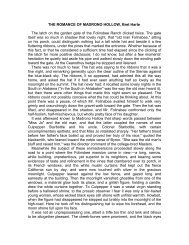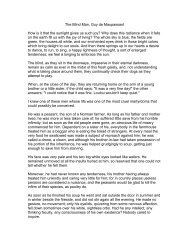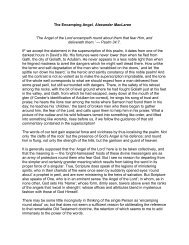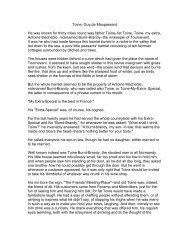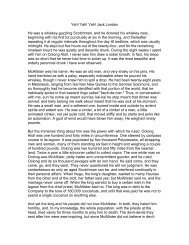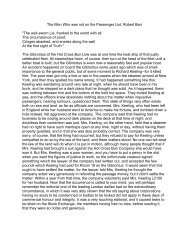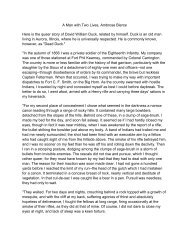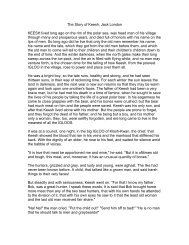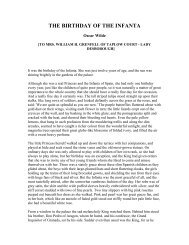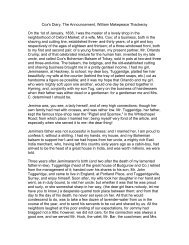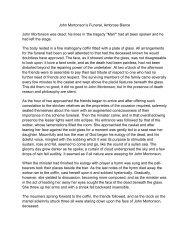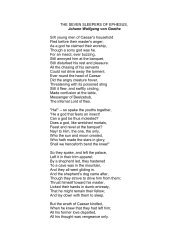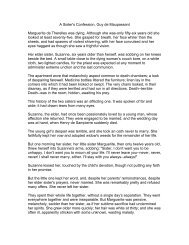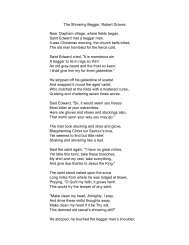The Trip of the Horla, Guy de Maupassant
The Trip of the Horla, Guy de Maupassant
The Trip of the Horla, Guy de Maupassant
Create successful ePaper yourself
Turn your PDF publications into a flip-book with our unique Google optimized e-Paper software.
<strong>The</strong> <strong>Trip</strong> <strong>of</strong> <strong>the</strong> <strong>Horla</strong>, <strong>Guy</strong> <strong>de</strong> <strong>Maupassant</strong>On <strong>the</strong> morning <strong>of</strong> July 8th I received <strong>the</strong> following telegram: "Fine day. Alwaysmy predictions. Belgian frontier. Baggage and servants left at noon at <strong>the</strong> socialsession. Beginning <strong>of</strong> manoeuvres at three. So I will wait for you at <strong>the</strong> worksfrom five o'clock on. Jovis."At five o'clock sharp I entered <strong>the</strong> gas works <strong>of</strong> La Villette. It might have beenmistaken for <strong>the</strong> colossal ruins <strong>of</strong> an old town inhabited by Cyclops. <strong>The</strong>re wereimmense dark avenues separating heavy gasometers standing one behindano<strong>the</strong>r, like monstrous columns, unequally high and, undoubtedly, in <strong>the</strong> past<strong>the</strong> supports <strong>of</strong> some tremendous, some fearful iron edifice.<strong>The</strong> balloon was lying in <strong>the</strong> courtyard and had <strong>the</strong> appearance <strong>of</strong> a cake ma<strong>de</strong><strong>of</strong> yellow cloth, flattened on <strong>the</strong> ground un<strong>de</strong>r a rope. That is called placing aballoon in a sweep-net, and, in fact, it appeared like an enormous fish.Two or three hundred people were looking at it, sitting or standing, and somewere examining <strong>the</strong> basket, a nice little square basket for a human cargo,bearing on its si<strong>de</strong> in gold letters on a mahogany plate <strong>the</strong> words: Le <strong>Horla</strong>.Sud<strong>de</strong>nly <strong>the</strong> people began to stand back, for <strong>the</strong> gas was beginning to enter into<strong>the</strong> balloon through a long tube <strong>of</strong> yellow cloth, which lay on <strong>the</strong> soil, swelling andundulating like an enormous worm. But ano<strong>the</strong>r thought, ano<strong>the</strong>r picture occursto every mind. It is thus that nature itself nourishes beings until <strong>the</strong>ir birth. <strong>The</strong>creature that will rise soon begins to move, and <strong>the</strong> attendants <strong>of</strong> Captain Jovis,as Le <strong>Horla</strong> grew larger, spread and put in place <strong>the</strong> net which covers it, so that<strong>the</strong> pressure will be regular and equally distributed at every point.<strong>The</strong> operation is very <strong>de</strong>licate and very important, for <strong>the</strong> resistance <strong>of</strong> <strong>the</strong> cottoncloth <strong>of</strong> which <strong>the</strong> balloon is ma<strong>de</strong> is figured not in proportion to <strong>the</strong> contactsurface <strong>of</strong> this cloth with <strong>the</strong> net, but in proportion to <strong>the</strong> links <strong>of</strong> <strong>the</strong> basket.Le <strong>Horla</strong>, moreover, has been <strong>de</strong>signed by M. Mallet, constructed un<strong>de</strong>r his owneyes and ma<strong>de</strong> by himself. Everything had been ma<strong>de</strong> in <strong>the</strong> shops <strong>of</strong> M. Jovisby his own working staff and nothing was ma<strong>de</strong> outsi<strong>de</strong>.We must add that everything was new in this balloon, from <strong>the</strong> varnish to <strong>the</strong>valve, those two essential parts <strong>of</strong> a balloon. Both must ren<strong>de</strong>r <strong>the</strong> cloth gaspro<strong>of</strong>,as <strong>the</strong> si<strong>de</strong>s <strong>of</strong> a ship are waterpro<strong>of</strong>. <strong>The</strong> old varnishes, ma<strong>de</strong> with a base<strong>of</strong> linseed oil, sometimes fermented and thus burned <strong>the</strong> cloth, which in a shorttime would tear like a piece <strong>of</strong> paper.<strong>The</strong> valves were apt to close imperfectly after being opened and when <strong>the</strong>covering called "cataplasme" was injured. <strong>The</strong> fall <strong>of</strong> M. L'Hoste in <strong>the</strong> open seaduring <strong>the</strong> night proved <strong>the</strong> imperfection <strong>of</strong> <strong>the</strong> old system.
<strong>The</strong> two discoveries <strong>of</strong> Captain Jovis, <strong>the</strong> varnish principally, are <strong>of</strong> inestimablevalue in <strong>the</strong> art <strong>of</strong> ballooning.<strong>The</strong> crowd has begun to talk, and some men, who appear to be specialists, affirmwith authority that we shall come down before reaching <strong>the</strong> fortifications. Severalo<strong>the</strong>r things have been criticized in this novel type <strong>of</strong> balloon with which we areabout to experiment with so much pleasure and success.It is growing slowly but surely. Some small holes and scratches ma<strong>de</strong> in transithave been discovered, and we cover <strong>the</strong>m and plug <strong>the</strong>m with a little piece <strong>of</strong>paper applied on <strong>the</strong> cloth while wet. This method <strong>of</strong> repairing alarms andmystifies <strong>the</strong> public.While Captain Jovis and his assistants are busy with <strong>the</strong> last <strong>de</strong>tails, <strong>the</strong>travellers go to dine in <strong>the</strong> canteen <strong>of</strong> <strong>the</strong> gas-works, according to <strong>the</strong> establishedcustom.When we come out again <strong>the</strong> balloon is swaying, enormous and transparent, aprodigious gol<strong>de</strong>n fruit, a fantastic pear which is still ripening, covered by <strong>the</strong> lastrays <strong>of</strong> <strong>the</strong> setting sun. Now <strong>the</strong> basket is attached, <strong>the</strong> barometers are brought,<strong>the</strong> siren, which we will blow to our hearts' content, is also brought, also <strong>the</strong> twotrumpets, <strong>the</strong> eatables, <strong>the</strong> overcoats and raincoats, all <strong>the</strong> small articles that cango with <strong>the</strong> men in that flying basket.As <strong>the</strong> wind pushes <strong>the</strong> balloon against <strong>the</strong> gasometers, it is necessary to steadyit now and <strong>the</strong>n, to avoid an acci<strong>de</strong>nt at <strong>the</strong> start.Captain Jovis is now ready and calls all <strong>the</strong> passengers.Lieutenant Mallet jumps aboard, climbing first on <strong>the</strong> aerial net between <strong>the</strong>basket and <strong>the</strong> balloon, from which he will watch during <strong>the</strong> night <strong>the</strong> movements<strong>of</strong> Le <strong>Horla</strong> across <strong>the</strong> skies, as <strong>the</strong> <strong>of</strong>ficer on watch, standing on starboard,watches <strong>the</strong> course <strong>of</strong> a ship.M. Etierine Beer gets in after him, <strong>the</strong>n comes M. Paul Bessand, <strong>the</strong>n M. PatriceEyries and I get in last.But <strong>the</strong> basket is too heavy for <strong>the</strong> balloon, consi<strong>de</strong>ring <strong>the</strong> long trip to be taken,and M. Eyries has to get out, not without great regret.M. Joliet, standing erect on <strong>the</strong> edge <strong>of</strong> <strong>the</strong> basket, begs <strong>the</strong> ladies, in verygallant terms, to stand asi<strong>de</strong> a little, for he is afraid he might throw sand on <strong>the</strong>irhats in rising. <strong>The</strong>n he commands:
"Let it loose," and, cutting with one stroke <strong>of</strong> his knife <strong>the</strong> ropes that hold <strong>the</strong>balloon to <strong>the</strong> ground, he gives Le <strong>Horla</strong> its liberty.In one second we fly skyward. Nothing can be heard; we float, we rise, we fly, wegli<strong>de</strong>. Our friends shout with glee and applaud, but we hardly hear <strong>the</strong>m, wehardly see <strong>the</strong>m. We are already so far, so high! What? Are we really leaving<strong>the</strong>se people down <strong>the</strong>re? Is it possible? Paris spreads out beneath us, a darkbluish patch, cut by its streets, from which rise, here and <strong>the</strong>re, domes, towers,steeples, <strong>the</strong>n around it <strong>the</strong> plain, <strong>the</strong> country, traversed by long roads, thin andwhite, amidst green fields <strong>of</strong> a ten<strong>de</strong>r or dark green, and woods almost black.<strong>The</strong> Seine appears like a coiled snake, asleep, <strong>of</strong> which we see nei<strong>the</strong>r head nortail; it crosses Paris, and <strong>the</strong> entire field resembles an immense basin <strong>of</strong> prairiesand forests dotted here and <strong>the</strong>re by mountains, hardly visible in <strong>the</strong> horizon.<strong>The</strong> sun, which we could no longer see down below, now reappears as though itwere about to rise again, and our balloon seems to be lighted; it must appear likea star to <strong>the</strong> people who are looking up. M. Mallet every few seconds throws acigarette paper into-space and says quietly: "We are rising, always rising," whileCaptain Jovis, radiant with joy, rubs his hands toge<strong>the</strong>r and repeats: "Eh? thisvarnish? Isn't it good?"In fact, we can see whe<strong>the</strong>r we are rising or sinking only by throwing a cigarettepaper out <strong>of</strong> <strong>the</strong> basket now and <strong>the</strong>n. If this paper appears to fall down like astone, it means that <strong>the</strong> balloon is rising; if it appears to shoot skyward <strong>the</strong>balloon is <strong>de</strong>scending.<strong>The</strong> two barometers mark about five hundred meters, and we gaze wi<strong>the</strong>nthusiastic admiration at <strong>the</strong> earth we are leaving and to which we are notattached in any way; it looks like a colored map, an immense plan <strong>of</strong> <strong>the</strong> country.All its noises, however, rise to our ears very distinctly, easily recognizable. Wehear <strong>the</strong> sound <strong>of</strong> <strong>the</strong> wheels rolling in <strong>the</strong> streets, <strong>the</strong> snap <strong>of</strong> a whip, <strong>the</strong> cries <strong>of</strong>drivers, <strong>the</strong> rolling and whistling <strong>of</strong> trains and <strong>the</strong> laughter <strong>of</strong> small boys runningafter one ano<strong>the</strong>r. Every time we pass over a village <strong>the</strong> noise <strong>of</strong> children'svoices is heard above <strong>the</strong> rest and with <strong>the</strong> greatest distinctness. Some men arecalling us; <strong>the</strong> locomotives whistle; we answer with <strong>the</strong> siren, which emitsplaintive, fearfully shrill wails like <strong>the</strong> voice <strong>of</strong> a weird being wan<strong>de</strong>ring through<strong>the</strong> world.We perceive lights here and <strong>the</strong>re, some isolated fire in <strong>the</strong> farms, and lines <strong>of</strong>gas in <strong>the</strong> towns. We are going toward <strong>the</strong> northwest, after roaming for sometime over <strong>the</strong> little lake <strong>of</strong> Enghien. Now we see a river; it is <strong>the</strong> Oise, and webegin to argue about <strong>the</strong> exact spot we are passing. Is that town Creil orPontoise--<strong>the</strong> one with so many lights? But if we were over Pontoise we couldsee <strong>the</strong> junction <strong>of</strong> <strong>the</strong> Seine and <strong>the</strong> Oise; and that enormous fire to <strong>the</strong> left, isn'tit <strong>the</strong> blast furnaces <strong>of</strong> Montataire? So <strong>the</strong>n we are above Creil. <strong>The</strong> view is
superb; it is dark on <strong>the</strong> earth, but we are still in <strong>the</strong> light, and it is now past teno'clock. Now we begin to hear slight country noises, <strong>the</strong> double cry <strong>of</strong> <strong>the</strong> quail inparticular, <strong>the</strong>n <strong>the</strong> mewing <strong>of</strong> cats and <strong>the</strong> barking <strong>of</strong> dogs. Surely <strong>the</strong> dogs havescented <strong>the</strong> balloon; <strong>the</strong>y have seen it and have given <strong>the</strong> alarm. We can hear<strong>the</strong>m barking all over <strong>the</strong> plain and making <strong>the</strong> i<strong>de</strong>ntical noise <strong>the</strong>y make whenbaying at <strong>the</strong> moon. <strong>The</strong> cows also seem to wake up in <strong>the</strong> barns, for we canhear <strong>the</strong>m lowing; all <strong>the</strong> beasts are scared and moved before <strong>the</strong> aerial monsterthat is passing.<strong>The</strong> <strong>de</strong>licious odors <strong>of</strong> <strong>the</strong> soil rise toward us, <strong>the</strong> smell <strong>of</strong> hay, <strong>of</strong> flowers, <strong>of</strong> <strong>the</strong>moist, verdant earth, perfuming <strong>the</strong> air-a light air, in fact, so light, so sweet, so<strong>de</strong>lightful that I realize I never was so fortunate as to brea<strong>the</strong> before. A pr<strong>of</strong>oundsense <strong>of</strong> well-being, unknown to me heret<strong>of</strong>ore, perva<strong>de</strong>s me, a well-being <strong>of</strong>body and spirit, composed <strong>of</strong> supineness, <strong>of</strong> infinite rest, <strong>of</strong> forgetfulness, <strong>of</strong>indifference to everything and <strong>of</strong> this novel sensation <strong>of</strong> traversing space withoutany <strong>of</strong> <strong>the</strong> sensations that make motion unbearable, without noise, withoutshocks and without fear.At times we rise and <strong>the</strong>n <strong>de</strong>scend. Every few minutes Lieutenant Mallet,suspen<strong>de</strong>d in his cobweb <strong>of</strong> netting, says to Captain Jovis : "We are <strong>de</strong>scending;throw down half a handful." And <strong>the</strong> captain, who is talking and laughing with us,with a bag <strong>of</strong> ballast between his legs, takes a handful <strong>of</strong> sand out <strong>of</strong> <strong>the</strong> bag andthrows it overboard.Nothing is more amusing, more <strong>de</strong>licate, more interesting than <strong>the</strong> manoeuvring<strong>of</strong> a balloon. It is an enormous toy, free and docile, which obeys with surprisingsensitiveness, but it is also, and before all, <strong>the</strong> slave <strong>of</strong> <strong>the</strong> wind, which wecannot control. A pinch <strong>of</strong> sand, half a sheet <strong>of</strong> paper, one or two drops <strong>of</strong> water,<strong>the</strong> bones <strong>of</strong> a chicken which we had just eaten, thrown overboard, makes it goup quickly.A breath <strong>of</strong> cool, damp air rising from <strong>the</strong> river or <strong>the</strong> wood we are traversingmakes <strong>the</strong> balloon <strong>de</strong>scend two hundred metres. It does not vary when passingover fields <strong>of</strong> ripe grain, and it rises when it passes over towns.<strong>The</strong> earth sleeps now, or, ra<strong>the</strong>r, men sleep on <strong>the</strong> earth, for <strong>the</strong> beastsawakened by <strong>the</strong> sight <strong>of</strong> our balloon announce our approach everywhere. Nowand <strong>the</strong>n <strong>the</strong> rolling <strong>of</strong> a train or <strong>the</strong> whistling <strong>of</strong> a locomotive is plainlydistinguishable. We sound our siren as we pass over inhabited places; and <strong>the</strong>peasants, terrified in <strong>the</strong>ir beds, must surely tremble and ask <strong>the</strong>mselves if <strong>the</strong>Angel Gabriel is not passing by.A strong and continuous odor <strong>of</strong> gas can be plainly observed. We must haveencountered a current <strong>of</strong> warm air, and <strong>the</strong> balloon expands, losing its invisibleblood by <strong>the</strong> escape-valve, which is called <strong>the</strong> appendix, and which closes <strong>of</strong>itself as soon as <strong>the</strong> expansion ceases.
We are rising. <strong>The</strong> earth no longer gives back <strong>the</strong> echo <strong>of</strong> our trumpets; we haverisen almost two thousand feet. It is not light enough for us to consult <strong>the</strong>instruments; we only know that <strong>the</strong> rice paper falls from us like <strong>de</strong>ad butterflies,that we are rising, always rising. We can no longer see <strong>the</strong> earth; a light mistseparates us from it; and above our head twinkles a world <strong>of</strong> stars.A silvery light appears before us and makes <strong>the</strong> sky turn pale, and sud<strong>de</strong>nly, as ifit were rising from unknown <strong>de</strong>pths behind <strong>the</strong> horizon below us rises <strong>the</strong> moonon <strong>the</strong> edge <strong>of</strong> a cloud. It seems to be coming from below, while we are lookingdown upon it from a great height, leaning on <strong>the</strong> edge <strong>of</strong> our basket like anaudience on a balcony. Clear and round, it emerges from <strong>the</strong> clouds and slowlyrises in <strong>the</strong> sky.<strong>The</strong> earth no longer seems to exist, it is buried in milky vapors that resemble asea. We are now alone in space with <strong>the</strong> moon, which looks like ano<strong>the</strong>r balloontravelling opposite us; and our balloon, which shines in <strong>the</strong> air, appears likeano<strong>the</strong>r, larger moon, a world wan<strong>de</strong>ring in <strong>the</strong> sky amid <strong>the</strong> stars, throughinfinity. We no longer speak, think nor live; we float along through space in<strong>de</strong>licious inertia. <strong>The</strong> air which is bearing us up has ma<strong>de</strong> <strong>of</strong> us all beings whichresemble itself, silent, joyous, irresponsible beings, intoxicated by thisstupendous flight, peculiarly alert, although motionless. One is no longerconscious <strong>of</strong> one's flesh or one's bones; one's heart seems to have ceasedbeating; we have become something in<strong>de</strong>scribable, birds who do not even haveto flap <strong>the</strong>ir wings.All memory has disappeared from our minds, all trouble from our thoughts; wehave no more regrets, plans nor hopes. We look, we feel, we wildly enjoy thisfantastic journey; nothing in <strong>the</strong> sky but <strong>the</strong> moon and ourselves! We are awan<strong>de</strong>ring, travelling world, like our sisters, <strong>the</strong> planets; and this little worldcarries five men who have left <strong>the</strong> earth and who have almost forgotten it. Wecan now see as plainly as in daylight; we look at each o<strong>the</strong>r, surprised at thisbrightness, for we have nothing to look at but ourselves and a few silvery cloudsfloating below us. <strong>The</strong> barometers mark twelve hundred metres, <strong>the</strong>n thirteen,fourteen, fifteen hundred; and <strong>the</strong> little rice papers still fall about us.Captain Jovis claims that <strong>the</strong> moon has <strong>of</strong>ten ma<strong>de</strong> balloons act thus, and that<strong>the</strong> upward journey will continue.We are now at two thousand metres; we go up to two thousand three hundredand fifty; <strong>the</strong>n <strong>the</strong> balloon stops: We blow <strong>the</strong> siren and are surprised that no oneanswers us from <strong>the</strong> stars.We are now going down rapidly. M. Mallet keeps crying: "Throw out more ballast!throw out more ballast!" And <strong>the</strong> sand and stones that we throw over come back
into our faces, as if <strong>the</strong>y were going up, thrown from below toward <strong>the</strong> stars, sorapid is our <strong>de</strong>scent.Here is <strong>the</strong> earth! Where are we? It is now past midnight, and we are crossing abroad, dry, well-cultivated country, with many roads and well populated.To <strong>the</strong> right is a large city and far<strong>the</strong>r away to <strong>the</strong> left is ano<strong>the</strong>r. But sud<strong>de</strong>nlyfrom <strong>the</strong> earth appears a bright fairy light; it disappears, reappears and oncemore disappears. Jovis, intoxicated by space, exclaims: "Look, look at thisphenomenon <strong>of</strong> <strong>the</strong> moon in <strong>the</strong> water. One can see nothing more beautiful atnight!"Nothing in<strong>de</strong>ed can give one an i<strong>de</strong>a <strong>of</strong> <strong>the</strong> won<strong>de</strong>rful brightness <strong>of</strong> <strong>the</strong>se spots<strong>of</strong> light which are not fire, which do not look like reflections, which appear quicklyhere or <strong>the</strong>re and immediately go out again. <strong>The</strong>se shining lights appear on <strong>the</strong>winding rivers at every turn, but one hardly has time to see <strong>the</strong>m as <strong>the</strong> balloonpasses as quickly as <strong>the</strong> wind.We are now quite near <strong>the</strong> earth, and Beer exclaims:-- "Look at that! What is thatrunning over <strong>the</strong>re in <strong>the</strong> fields? Isn't it a dog?" In<strong>de</strong>ed, something is runningalong <strong>the</strong> ground with great speed, and this something seems to jump overditches, roads, trees with such ease that we could not un<strong>de</strong>rstand what it mightbe. <strong>The</strong> captain laughed: "It is <strong>the</strong> shadow <strong>of</strong> our balloon. It will grow as we<strong>de</strong>scend."I distinctly hear a great noise <strong>of</strong> foundries in <strong>the</strong> distance. And, according to <strong>the</strong>polar star, which we have been observing all night, 'and which I have so <strong>of</strong>tenwatched and consulted from <strong>the</strong> bridge <strong>of</strong> my little yacht on <strong>the</strong> Mediterranean,we are heading straight for Belgium.Our siren and our two horns are continually calling. A few cries from some truckdriver or belated reveler answer us. We bellow: "Where are we?" But <strong>the</strong> balloonis going so rapidly that <strong>the</strong> bewil<strong>de</strong>red man has not even time to answer us. <strong>The</strong>growing shadow <strong>of</strong> Le <strong>Horla</strong>, as large as a child's ball, is fleeing before us over<strong>the</strong> fields, roads and woods. It goes along steadily, preceding us by about aquarter <strong>of</strong> a mile; and now I am leaning out <strong>of</strong> <strong>the</strong> basket, listening to <strong>the</strong> roaring<strong>of</strong> <strong>the</strong> wind in <strong>the</strong> trees and across <strong>the</strong> harvest fields. I say to Captain Jovis :"How <strong>the</strong> wind blows!"He answers: "No, those are probably waterfalls." I insist, sure <strong>of</strong> my ear thatknows <strong>the</strong> sound <strong>of</strong> <strong>the</strong> wind, from hearing it so <strong>of</strong>ten whistle through <strong>the</strong> rigging.<strong>The</strong>n Jovis nudges me; he fears to frighten his happy, quiet passengers, for heknows full well that a storm is pursuing us.At last a man manages to un<strong>de</strong>rstand us; he answers: "Nord!" We get <strong>the</strong> samereply from ano<strong>the</strong>r.
Sud<strong>de</strong>nly <strong>the</strong> lights <strong>of</strong> a town, which seems to be <strong>of</strong> consi<strong>de</strong>rable size, appearbefore us. Perhaps it is Lille. As we approach it, such a won<strong>de</strong>rful flow <strong>of</strong> fireappears below us that I think myself transported into some fairyland whereprecious stones are manufactured for giants.It seems that it is a brick factory. Here are o<strong>the</strong>rs, two, three. <strong>The</strong> fusing materialbubbles, sparkles, throws out blue, red, yellow, green sparks, reflections fromgiant diamonds, rubies, emeralds, turquoises, sapphires, topazes. And near byare great foundries roaring like apocalyptic lions; high chimneys belch forth <strong>the</strong>irclouds <strong>of</strong> smoke and flame, and we can hear <strong>the</strong> noise <strong>of</strong> metal striking againstmetal."Where are we?"<strong>The</strong> voice <strong>of</strong> some joker or <strong>of</strong> a crazy person answers: "In a balloon!""Where are we?""At Lille!"We were not mistaken. We are already out <strong>of</strong> sight <strong>of</strong> <strong>the</strong> town, and we seeRoubaix to <strong>the</strong> right, <strong>the</strong>n some well-cultivated, rectangular fields, <strong>of</strong> differentcolors according to <strong>the</strong> crops, some yellow, some gray or brown. But <strong>the</strong> cloudsare ga<strong>the</strong>ring behind us, hiding <strong>the</strong> moon, whereas toward <strong>the</strong> east <strong>the</strong> sky isgrowing lighter, becoming a clear blue tinged with red. It is dawn. It grows rapidly,now showing us all <strong>the</strong> little <strong>de</strong>tails <strong>of</strong> <strong>the</strong> earth, <strong>the</strong> trains, <strong>the</strong> brooks, <strong>the</strong> cows,<strong>the</strong> goats. And all this passes beneath us with surprising speed. One hardly hastime to notice that o<strong>the</strong>r fields, o<strong>the</strong>r meadows, o<strong>the</strong>r houses have alreadydisappeared. Cocks are crowing, but <strong>the</strong> voice <strong>of</strong> ducks drowns everything. Onemight think <strong>the</strong> world to be peopled, covered with <strong>the</strong>m, <strong>the</strong>y make so muchnoise.<strong>The</strong> early rising peasants are waving <strong>the</strong>ir arms and crying to us: "Let yourselvesdrop!" But we go along steadily, nei<strong>the</strong>r rising nor falling, leaning over <strong>the</strong> edge <strong>of</strong><strong>the</strong> basket and watching <strong>the</strong> world fleeing un<strong>de</strong>r our feet.Jovis sights ano<strong>the</strong>r city far <strong>of</strong>f in <strong>the</strong> distance. It approaches; everywhere are oldchurch spires. <strong>The</strong>y are <strong>de</strong>lightful, seen thus from above. Where are we? Is thisCourtrai? Is it Ghent?We are already very near it, and we see that it is surroun<strong>de</strong>d by water andcrossed in every direction by canals. One might think it a Venice <strong>of</strong> <strong>the</strong> north.Just as we are passing so near to a church tower that our long guy-rope almosttouches it, <strong>the</strong> chimes begin to ring three o'clock. <strong>The</strong> sweet, clear sounds rise tous from this frail ro<strong>of</strong> which we have almost touched in our wan<strong>de</strong>ring course. It
is a charming greeting, a friendly welcome from Holland. We answer with oursiren, whose raucous voice echoes throughout <strong>the</strong> streets.It was Bruges. But eve have hardly lost sight <strong>of</strong> it when my neighbor, PaulBessand, asks me: "Don't you see something over <strong>the</strong>re, to <strong>the</strong> right, in front <strong>of</strong>us? It looks like a river."And, in<strong>de</strong>ed, far ahead <strong>of</strong> us stretches a bright highway, in <strong>the</strong> light <strong>of</strong> <strong>the</strong>dawning day. Yes, it looks like a river, an immense river full <strong>of</strong> islands."Get ready for <strong>the</strong> <strong>de</strong>scent," cried <strong>the</strong> captain. He makes M. Mallet leave his netand return to <strong>the</strong> basket; <strong>the</strong>n we pack <strong>the</strong> barometers and everything that couldbe injured by possible shocks. M. Bessand exclaims: "Look at <strong>the</strong> masts over<strong>the</strong>re to <strong>the</strong> left! We are at <strong>the</strong> sea!"Fogs had hid<strong>de</strong>n it from us until <strong>the</strong>n. <strong>The</strong> sea was everywhere, to <strong>the</strong> left andopposite us, while to our right <strong>the</strong> Scheldt, which had joined <strong>the</strong> Moselle,exten<strong>de</strong>d as far as <strong>the</strong> sea, its mouths vaster than a lake.It was necessary to <strong>de</strong>scend within a minute or two. <strong>The</strong> rope to <strong>the</strong> escapevalve,which had been religiously enclosed in a little white bag and placed insight <strong>of</strong> all so that no one would touch it, is unrolled, and M. Mallet holds it in hishand while Captain Jovis looks for a favorable landing.Behind us <strong>the</strong> thun<strong>de</strong>r was rumbling and not a single bird followed our mad flight."Pull!" cried Jovis.We were passing over a canal. <strong>The</strong> basket trembled and tipped over slightly. <strong>The</strong>guy-rope touched <strong>the</strong> tall trees on both banks. But our speed is so great that <strong>the</strong>long rope now trailing does not seem to slow down, and we pass with frightfulrapidity over a large farm, from which <strong>the</strong> bewil<strong>de</strong>red chickens, pigeons andducks fly away, while <strong>the</strong> cows, cats and dogs run, terrified, toward <strong>the</strong> house.Just one-half bag <strong>of</strong> ballast is left. Jovis throws it overboard, and Le <strong>Horla</strong> flieslightly across <strong>the</strong> ro<strong>of</strong>.<strong>The</strong> captain once more cries: "<strong>The</strong> escape-valve!"M. Mallet reaches for <strong>the</strong> rope and hangs to it, and we drop like an arrow. With aslash <strong>of</strong> a knife <strong>the</strong> cord which retains <strong>the</strong> anchor is cut, and we drag this grapplebehind us, through a field <strong>of</strong> beets. Here are <strong>the</strong> trees."Take care! Hold fast! Look out for your heads!"We pass over <strong>the</strong>m. <strong>The</strong>n a strong shock shakes us. <strong>The</strong> anchor has taken hold.



